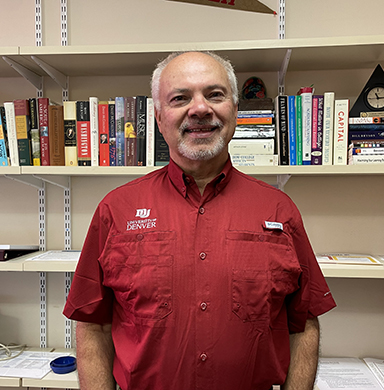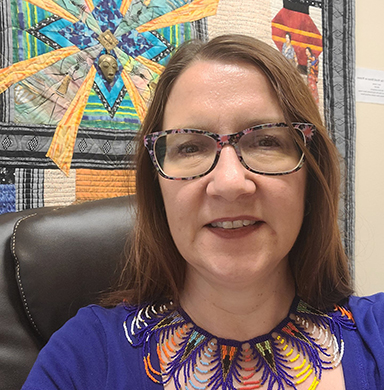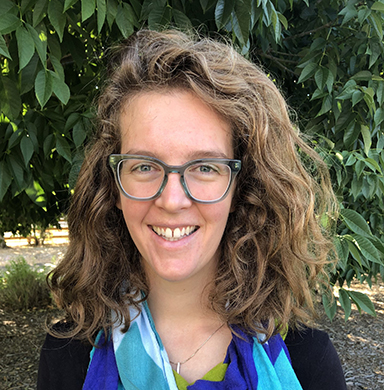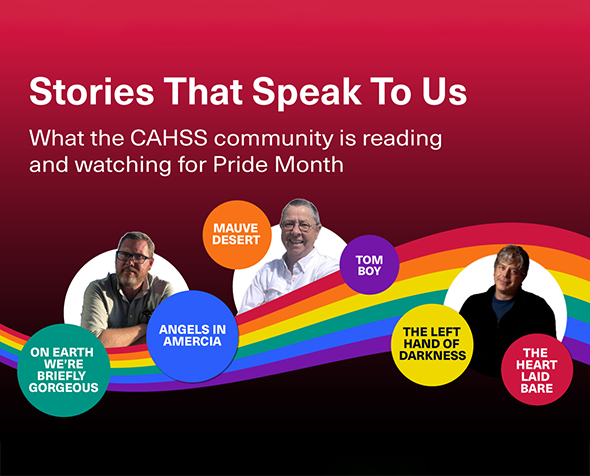Stories that Speak to Us: What Student-Support Staff Recommend Reading, Watching and Listening to as a New School Year Begins

Stories told through literature, theatre, podcasts, film, video games and television inspire and empower, connecting us deeply and reflectively with our personal and collective experience in ways that often reverberate throughout our lives. The College of Arts, Humanities & Social Sciences (CAHSS) newsroom periodically asks CAHSS faculty, students and staff to contribute their recommendations in specific categories geared toward specific topics for our “Stories that Speak to Us” series.
As the CAHSS community celebrates the beginning of a new school year, we asked staff members in student-support positions to explain how they work daily with students, and recommend stories related to higher education or navigating the college experience.
Michael Rusk, CAHSS graduation success partner
My role offers me a daily opportunity to help students succeed by staying on track with their program requirements. I use our degree audit software to examine the progress students are making with their common curriculum, major and minor requirements. I also communicate with students and the registrar about any discrepancies in completed courses as part of students’ overall academic plan.
One of my goals is to help students graduate with the right number of credits. I also nudge them toward their first required minor by noticing several successful courses taken in the same academic area. I contribute to academic alert efforts by contacting students about their current situation and advising them about options and resources for academic improvement.
A book I would share with anyone and especially college students is, “Enlightenment Now: The Case for Reason, Science, Humanism, and Progress,” by Steven Pinker. I believe this book fits into DU’s holistic 4D Experience very well. The author once responded to a college student when she asked, “Why should I live” with this inspiring quote:
“In the very act of asking that question, you are seeking reasons for your convictions, and so you are committed to reason as a means to discover and justify what is important to you. There are so many reasons to live!
As a sentient being, you have the potential to flourish. You can refine your faculty of reason itself by learning and debating. You can seek explanations of the natural world through science, and insight into the human condition through the arts and humanities …”
Ethel Swartley, associate director, Center for World Languages & Cultures (CWLC)
I supervise the free language tutors who work in the Language Center at the Anderson Academic Commons. I also oversee the CWLC’s non-credit “Languages for You!” and community language programs. To offer languages like Farsi, Turkish, Swahili and Vietnamese, I hire students who are fluent in, or native speakers of, these languages to work one-on-one with people who want to learn their language.
Working in an intercultural environment — whether studying abroad, as an international student or coming from a multilingual background in the U.S. — it’s so easy for people to feel pressured to “fit in.” Yet one of the things I love most about my job is encouraging students not to hide but instead to share the linguistic and cultural diversity that they bring to DU.
My summer reading included a book along those lines about preserving indigenous languages, “How to Keep Your Language Alive: A Commonsense Approach to One-on-One Language Learning” by Leanne Hinton. This followed on the heels of reading Andrew Forsthoefel’s “Walking to Listen: 4,000 Miles Across America, One Story at a Time.” This book gave me so much hope about the good-heartedness of Americans in welcoming strangers, despite the divisiveness that we hear about in the news.
Too often students get to campus and think they don’t belong, just because they’re dealing with a different culture here and have been uprooted from their family and friend groups back home. I’ve felt that way myself at times, and I always turn to Amy Cuddy's Inspiring TED Talk, “Your Body Language May Shape Who You Are.” Overcoming a personal tragedy with the support of her faculty mentors, Cuddy learned that it was important not to just “fake it ‘til you make it,” but actually to “fake it ‘til you become it” — that it’s possible to succeed even when you feel you don’t fit in. When learning a new language and culture, there’s probably no better advice than to listen, observe, prepare and then — just fake it. You’ll be surprised how people will work with you to help you get your message across.
Olivia Tracy, assistant director, University Writing Center, and teaching assistant professor in the University Writing Program
In the University Writing Center, we’re here to support your writing work and help you consider your writing experiences to make choices in your writing. We work with all DU students, staff and faculty as part of the program’s mission to foster the inclusive, accessible, collaborative and ethical writing and literacy practices needed in diverse rhetorical contexts. Talking about writing with others helps me, and many of us, learn, create connections with others and celebrate the communities we come from.
Our graduate and advanced undergraduate peer consultants help writers in all fields and majors and at all levels to make informed choices about how they navigate language, literacy and learning in the writing they do — whether they’re working on a literature review, a set of poems, a grant proposal or a blog post.
As assistant director, I’ve been reading the Writing Center blog, "Center Action," which focuses on imagining and acting toward linguistic justice in higher education and celebrating DU students’ diverse experiences with language. From the first post, the blog invites us, as a community, to imagine what it means to create a linguistically just world. One way we can imagine toward linguistic justice is by recognizing students’ real experiences speaking and writing across languages, as we learn in the most recent blog posts written by students from Teaching Assistant Professor Kathleen Guerra's Spring 2023 advanced seminar, “The Politics of Bilingualism in the U.S.”








